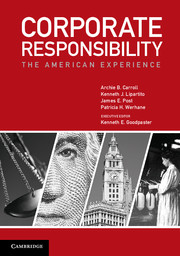Book contents
Preface
Published online by Cambridge University Press: 05 November 2012
Summary
Preface
“Has there ever been a robust history of corporate responsibility – a platform for looking toward the social and economic future?”
“No, Harry,” I said, “I don’t think so, but I’ll confirm that for you if you like.”
“All right, and if you confirm it, would you consider actually doing such a history if I provide the resources and stay out of the way? It should be an objective, nonideological account of corporate responsibility. If business is going to be a driver for positive social change in the future, we have got to understand its past.”
“But Harry, I’m not a trained historian. I’m a philosopher.”
“Yes, I know,” he said, “but I would like you to consider taking this on nonetheless!”
A question, some reluctance, then persistence, acceptance, enthusiasm. This was the genesis in 2004 of the project that has led to this volume. It was born of the determination of a successful, tough-minded business leader and the eventual passion of a practical philosopher.
“Harry” was Harry Halloran, a Philadelphia entrepreneur whose philanthropic foundation gave a major gift to the University of St. Thomas in 2007 to make the history project possible.
The moment of acceptance, however, raised a bundle of questions:
The history of what?
Was it to be a history of business or corporate behavior?
Was it to be the history of an idea — “corporate responsibility”?
Would it also be a history of certain academic disciplines?
Was it to be a world history or an American history?
- Type
- Chapter
- Information
- Corporate ResponsibilityThe American Experience, pp. xvi - xxiiPublisher: Cambridge University PressPrint publication year: 2012



